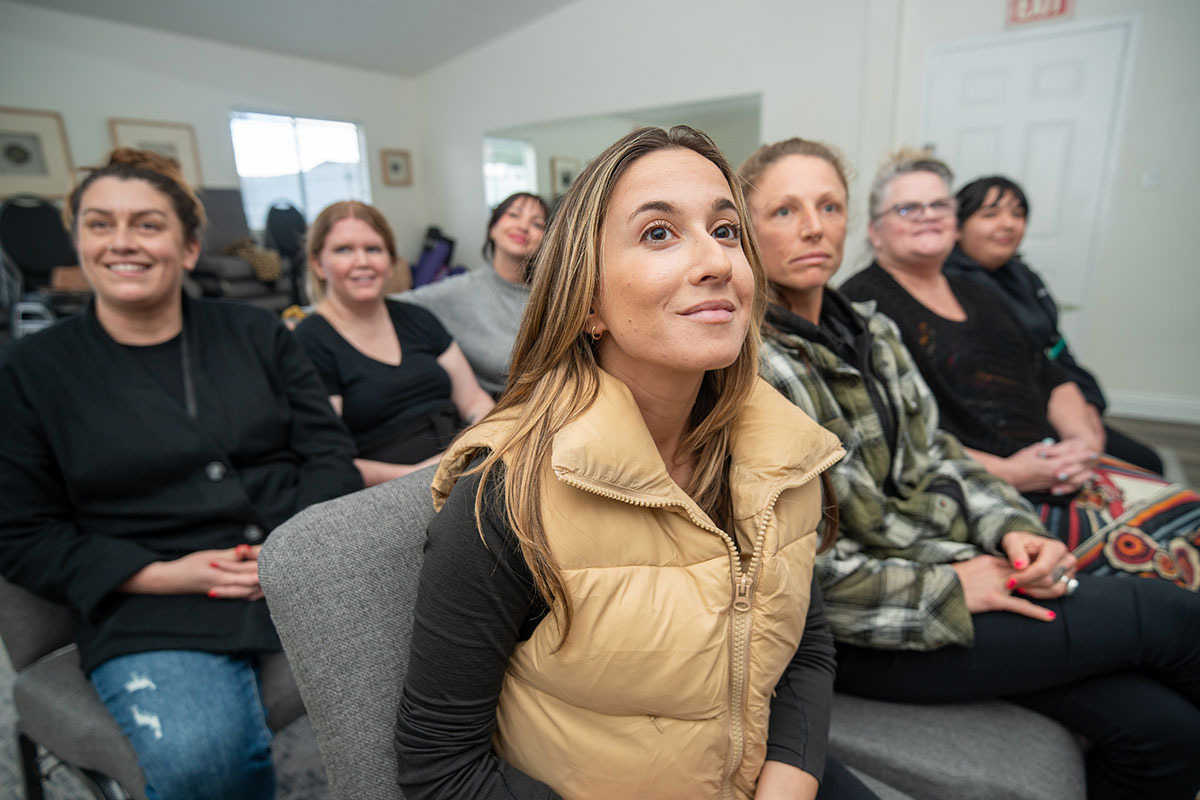
Usually, people will treat short-term insomnia by taking sleeping pills. Still, many people do not know that they are incredibly addictive substances — roughly 38 million medicines for sleeping pills like Ambien were prescribed between 2006 and 2011.
Sleeping pills are easily accessed and recognized as a sleep blessing medication that people become dependent on without realizing it. It usually isn’t until someone stops taking sleeping pills that they realize they’re dependent on them. From there, they’ll experience withdrawal symptoms, which is a telltale sign of sleeping pill addictions.
Signs of sleeping pill addictions include:
- Failed attempts to quit
- Experiencing cravings for sleeping pills
- Visiting multiple doctors for prescription refills
- Continuing to take sleeping pills despite knowing the harmful consequences
- Experiencing frequent memory loss from taking sleeping pills
Dependence can develop and exhibit various behaviors, like when someone increases their dose without consulting their doctor, or they appear to be continually craving to use some sedative. Someone suffering from sleep interruption may find themselves taking more sleeping pills than prescribed or mixing the dose with alcohol, enhancing the chances of a drug and alcohol addiction. This could even occur through the medication guides, which contain clear instructions for the client to take the exact amount per dose.
What Are Sleeping Pills?
Sleeping pills are categorized as drugs referred to as sedative-hypnotics. This class of drugs also includes benzodiazepines (“benzos”) and barbiturates like Xanax. Unlike other medications in this category, sleeping pills are non-benzodiazepine hypnotics. They are commonly known as “z-drugs” due to their ability to induce sleep.
The three most common sleeping pills are:
- Ambien
- Lunesta
- Sonata
Although a majority of non-benzodiazepine sleeping pills have various molecular compositions, they all produce similar effects. Sleeping pills connect to the same GABA receptors in the brain as benzos do, but they are assumed to produce fewer side effects.
Sleeping Pills Effects and Abuse
Sleeping pills are used to treat short-term insomnia, though many of them can lead to abuse and addiction. Although they do have a legitimate purpose, sleeping pills also come with significant side effects and risks that many people do not realize. If you can identify the signs of addiction, you could save someone’s life.
Many users underestimate the powerful grip that sleeping pills like Salata or Ambien have over their lives and the dangers of abusing them. Many people who abuse sleeping pills will experience concentration and memory problems.
Side effects of sleeping pills include:

- Dizziness
- Dreamless sleep
- Hallucinations
- Lack of coordination
- Lightheadedness
- Reduced anxiety
Signs of sleeping pill abuse include:
- Impaired memory
- Uncoordinated movements
- Unable to focus
- Unsteady motion
- Unusual euphoria
- Slurred speech
Sleeping pill addictions have also escalated for college and high school students who are looking to get high. Combining these medications with alcohol or other drugs can enhance their effects. Among the younger generation still living at home, access to prescription sleeping pills is effortless to obtain.
Over time, the brain becomes accustomed to sleeping pills’ effects, making recovery more challenging. People recovering from sleeping pill addictions will also often suffer from rebound insomnia and become even worse than before. This is a common side effect and must not be used as an excuse to continue taking sleeping pills. Fortunately, medical detox and residential treatment can help minimize withdrawal symptoms and help users discontinue sleeping pill abuse.
What is Rebound Insomnia?
Rebound insomnia is the resurgence of disrupted sleep once a user discontinues taking sleeping pills. This is one of the severe withdrawal side effects of sleeping pills that most habitual users experience. It can happen when the user suddenly stops taking their sleeping pills or reduces their dosages. Often, this form of insomnia becomes worse than the initial insomnia. This type of insomnia could even cause disturbing and bizarre dreams that can lead to panic attacks and increased anxiety when waking.
Withdrawal symptoms from sleeping pill addiction and should not be considered a reason to continue using the medication. It’s usually the cause of relapse for recovering and creating a dangerous abuse cycle.
The Risks of Sleeping Pills
Both long-term and immediate sleeping pill addiction risks are enough for most people to exercise caution when taking them. However, most people aren’t aware of the threats that come with taking these medications. The dangerous consequences of sleep medications vary from seizures to depressed breathing. Some people also experience allergic reactions from sleep medication that can cause chest pain, nausea, difficulty breathing, and swelling.
People who abuse sleeping pills could even develop parasomnias, although this is rare. Parasomnias are sleep disorders that include behaviors like sleep sex, sleep-driving, sleepwalking, sleep eating, and other possibly dangerous sleep-related actions.
The immediate risks of taking sleeping pills range from minor weakness to insomnia. Some of the side effects could even cause a fatal overdose, shedding light on sleeping pill addiction’s actual dangers.
Sleeping Pill Addictions Symptoms Include:
- Urge to use sleeping pills during the day
- Daytime drowsiness
- Depressed breathing
- Difficulty with coordination
- Dizziness
- Dry mouth
- Experiencing fewer effects from the same dose
- Itching and swelling
- Lightheadedness
- Memory loss
- Preoccupation with bedtime to take medication
- Relying on sleeping pills to fall asleep nightly
- Running out of prescription early
- Taking sleeping pills to feel euphoric effects
- Unusual dreams
People using sleeping pills over an extended period to treat sleep disorders are likely to encounter intense side effects. As they proceed to take sleeping pills over time, their bodies will begin to produce undesired side effects. These effects may include irregular heartbeat, high blood pressure, and depression.
Signs of Sleeping Pill Addiction
In 2013, nearly 9 million U.S. citizens frequently abused sleeping pills to fall asleep at night.
Daytime Drowsiness
Dry Mouth
Dizziness
Lightheadedness
Unusual Dreams
Identifying a Sleeping Pill Addiction
Sleeping pills can cause physical dependence, especially when taken for more than two weeks. People usually lack an understanding of how fast tolerance occurs with sleeping pills, mainly when they take extra doses. Tolerance can produce both physical dependence and addiction.
Numerous people who develop sleeping pill addiction have admitted to increasing their dose after the original effects had decreased. Over time, the tolerance they developed had turned into a sleeping pill addiction. The first step in overcoming sleeping pill addiction is realizing that there’s a problem.
Analysis has outlined the full guidelines for clinically diagnosing sleeping pill addictions. These criteria include physical, behavioral, and psychological symptoms that occur from extended drug use.
Those who are suffering from sleeping pill addiction symptoms may display the following behaviors:
- Appearing confused or frequently detached
- Attempting and failing to quit more than once
- Craving sleeping pills
- Disengaging in previously enjoyed activities
- Engaging in dangerous behavior while under the influence
- Experiencing mood swings
- Experiencing withdrawal symptoms
- Neglecting social, professional, educational, and familial obligations
- Requiring larger doses to fall asleep
- Secluding oneself from friends and family
Common Substance Combinations
Most people don’t regard the warning labels on their prescription bottles that advise against mixing them with alcohol. Using sleeping pills like Ambien with alcohol can be a lethal combination.
Alcohol can amplify the sedative effects of sleeping pills, increasing the possibility of a fatal overdose. However, those suffering from severe addiction might choose to use alcohol to boost their potency.
Other drugs frequently taken with sleeping pills include:
- Antidepressants
- Benzodiazepines
- Painkillers
Sleeping Pill Addiction Statistics
- In 2012, 21% of people suffering from sleeping pill addictions had thoughts about their substance abuse.
- In 2011, 30,149 people were admitted to the emergency room due to taking the Ambien for nonmedical use.
- In 2013, nearly 9 million US citizens frequently abused sleeping pills to fall asleep at night.
Breaking an addiction can be challenging when not having the support of an addiction treatment center. Different options, such as support groups at a treatment center, can help a struggling person through their addiction. If you or a loved one struggles to overcome a sleeping pill addiction, it is crucial to contact a rehab center for more information about detox services and treatment.
How Quickly Can You Get Addicted to Sleeping Pills?
People suffering from sleeping pill addictions could become dependent as quickly as seven days, and upon quitting, they will sometimes experience severe withdrawal symptoms. The withdrawal symptoms could last weeks, depending on a person’s age, gender, dosage levels, and length of time using. The best way to manage sleeping pill addiction withdrawal symptoms is by going through medical detox. The severity of the withdrawal symptoms will vary for each person.
Is It Ok To Take Sleeping Pills Every Night?
Most professionals agree that sleeping pills should be used for short-term purposes. For instance, sleeping pills are best used for short-term circumstances, such as jet lag, or similar issues. Studies show that long-term use may be linked to adverse side effects and a higher risk of mortality.
What Are the Side Effects of Taking Sleeping Pills Every Night?
Common side effects of sleeping pills include:
- Anxiety
- Depression
- Excessive sweating
- Insomnia
- Irritability
- Muscle tension
- Nausea
- Panic attacks
- Seizures
- Vomiting
Sleeping Pill Addiction Treatment in California
 Addictions are complicated for many people, but it can be managed appropriately. A trained medical specialist can help in overcoming sleeping pill addiction without experiencing severe withdrawal symptoms.
Addictions are complicated for many people, but it can be managed appropriately. A trained medical specialist can help in overcoming sleeping pill addiction without experiencing severe withdrawal symptoms.
Addiction treatment for sleeping pills is typically carried out in a residential or intensive outpatient program. Residential treatment is where the client lives at the residential facility and is under around the clock medical and psychological observation. This is considered the best approach for obtaining and maintaining lifelong sobriety. Residential treatment is especially recommended for people suffering from a severe addiction to sleeping pills, those who have been unsuccessful with rehab previously, and people living in an environment where alcohol and drugs are available.
Intensive outpatient programs will not include a residential stay or medical supervision, but they do require clients to meet multiple times per week for a few hours each day. Outpatient treatment is best for people who have already completed a residential treatment program and need to readjust to everyday life. It’s also ideal for those who have work, school, or a loved one that depends on them. Those considering outpatient treatment should have a substance abuse evaluation administered by a treatment specialist to determine which level of care is suitable.
Get Help for Sleeping Pill Addiction Today
If you or a loved one is suffering from addiction, getting help is not only necessary but could be life-saving. Here at New Directions For Women, our treatment specialists have the knowledge and experience to help in overcoming addiction. With our ability to administer a medical detox and round-the-clock monitoring, we can help treat sleeping pill addiction at its core.
Do not hesitate any longer. Call us today at New Directions For Women and allow our admissions specialists to answer any questions










